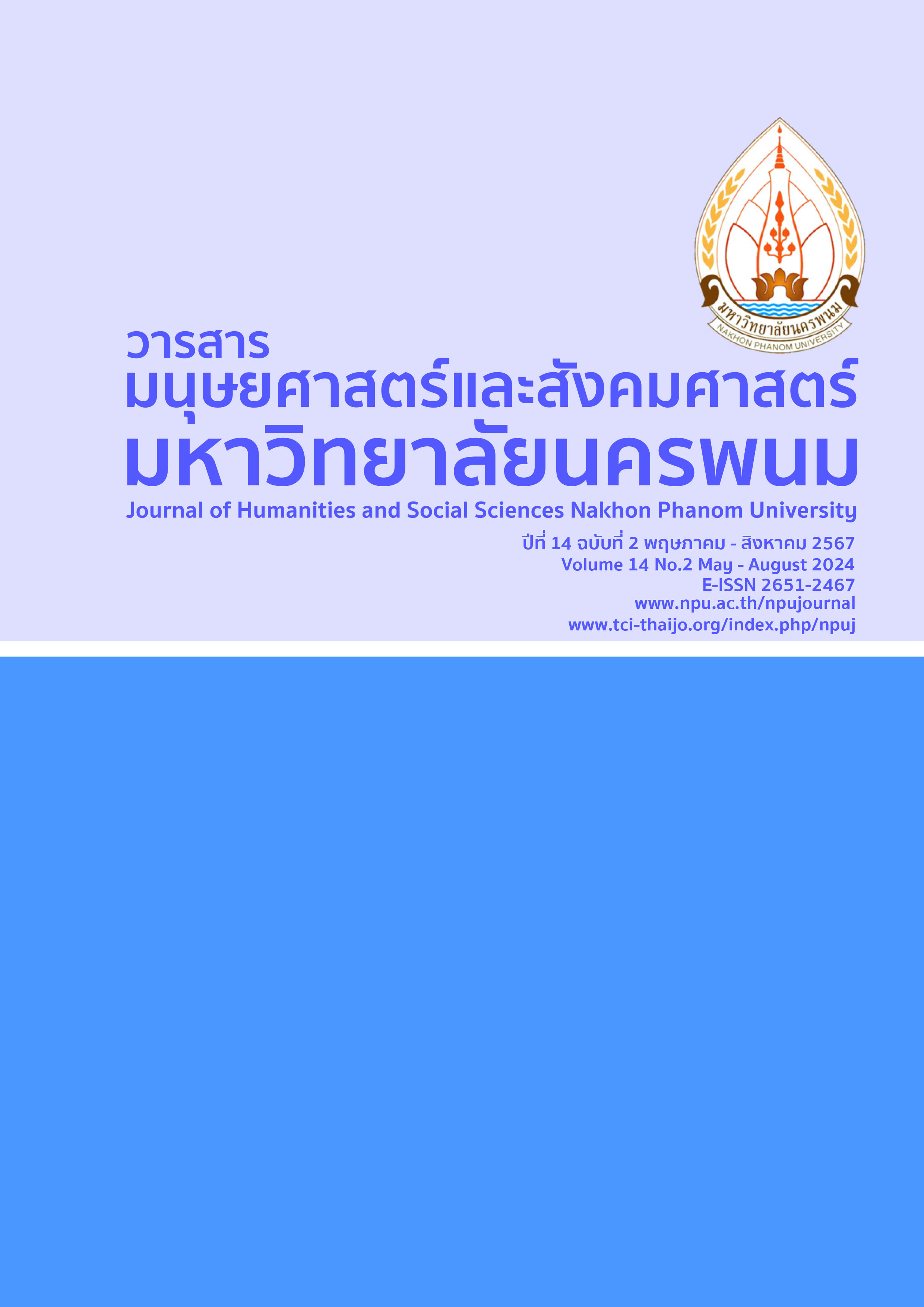Study The Situation of Multicultural Diversity learning Management Issues Among Dance Teachers in The Southern Region Study The Situation of Multicultural Diversity learning Management Issues Among Dance Teachers in The Southern Region
Main Article Content
Abstract
The purpose of this research is to study the situation of multicultural diversity learning management issues among dance teachers in the southern region, utilizing both quantitative and qualitative data collection methods. The sample population and key informants consist of 1) Dance teachers under the jurisdiction of the Secondary Educational Service Area Office 14, Southern Province, totaling 179 persons, and 2) Specialists in fields relevant to the research, encompassing experts in multiculturalism, experts in performing arts, and specialists in the field of education, totaling 15 individuals. Three instruments were employed in the research: 1) Interviews form addressing issues in learning management among dance teachers in the southern region; 2) Assessment tool for evaluating the competency of dance teachers in multicultural learning management in the southern region; and 3) Forms for recording expert group discussions. The study's findings reveal that the majority of dance teachers exhibit a constrained understanding of culture and an inaccurate comprehension of multicultural education. Consequently, the average evaluation of dance teachers' knowledge level pertaining to culture and education, as per the multicultural approach, was deemed to be at a moderate level. In terms of organizing the learning process to accommodate the cultural diversity of learners, most instructors persist in utilizing teacher-centered learning concepts and methods, relying on standardized teaching materials such as lesson plans, educational content, textbooks, and learning activities sourced from external publishers' manuals. This prevalent practice engenders a lack of diversity and fails to accurately reflect reality, highlighting deficiencies in the integration skill for integrating learning to suit the spatial context and the diverse needs of learners. Furthermore, educational institutions are observed to lack essential resources to support effective learning, including materials and facilities such as dance laboratories, alongside limited opportunities for regular instructors to enhance their multicultural skills, owing to constrained budgets for educational organization. Additionally, some dance teachers exhibit negative attitudes towards students from diverse religious and ethnic backgrounds, resulting in diminished expectations and a perception of dance as a specialized discipline unsuitable for all learner groups. From the perspective of the issues identified, the majority of dance teachers demonstrate a strong inclination towards developing the multicultural learning management competencies of dance teachers.
Article Details

This work is licensed under a Creative Commons Attribution-NonCommercial-NoDerivatives 4.0 International License.
References
Arpatthananon, T. (2020). Developing multicultural schools to enhance cultural competency through education for teachers and students in Thailand. Nakhon Pathom : Mahidol University.
Banks, J. A. (2007). Educating Citizens in a Multicultural Society. New York : Teachers College Press.
Boontongleg, M. (2021). Developing a Learning Management Model of Thai Dance for Global Citizenship (Unpublished Doctoral Dissertation). Rajamangala University of Technology Thanyaburi, Pathum Thani, Thailand.
Boonyaphitak, B. (2017). The innovation of student teachers development to enhance teaching competency for learning to live together. Bangkok : National Research Council of Thailand and The Thailand Research Fund.
Cronbach, (1970). The evolution of research. New York : Harper Collins.
Hair, J. F., Black, W. C. & Anderson, R.E. (2010). Multivariate data Analysis. (6thed). New Jersey : Pearson Education International.
Luangransee, P. (2021). A Model for Developing Research Competency for Learning Development of Teacher Students at a Multicultural Society the Southern Border Province: A Design-Based Research (Unpublished Doctoral Dissertation). Naresuan University, Phitsanulok, Thailand.
Nawarat, N. (2018). Multicultural Education Critical Perspectives and Praxis in Schooling. Chiang Mai : Chiang Mai University.
Nieto, S. (2003). What keeps teachers going?. New York : Teachers College Press.
Nieto, S. & Bode, P. (2007). School Reform and Student Learning: A Multicultural Perspective. In J. A. Banks & C. A. M. Banks (Eds.), Multicultural Education: Issues and Perspectives. (10thed). (pp. 267-283). Wiley.
Ozturgut, O. (2011). Understanding Multicultural Education. United States of America : Mary Lou Fulton teachers College Arizona State University.
Reungsri, S. & Dhedchawanagon, K. (2021). Context and Factors Affecting the Process of Preparing Teachers for Multicultural Classrooms. RMUTL Journal of Business Administration and Liberal Arts, 9(1),59–76.
Senge, P. (2017). Schools that learn: A Fifth Discipline Fieldbook for Educators, Parents, and Everyone Who Cares About Education. Bangkok : National Library of Thailand.
Sirisakdamkeung, P. (2006). Phahu watthanatham niyom [Multiculturalism]. Bangkok : Silpakorn University.
Srisa-art. B. (2010). Preliminary Research. Bangkok : Phiriyasan.
Thomas, E. (2002). Culture and schooling: Building bridges between research, praxis and professionalism. Hoboken, New Jersey : Wiley.
Willis, I. (2000). Critical issue: Addressing Literacy Needs in Culturally and Diverse Classrooms. North Central Regional Educational Lab, Illinois : Oakbrook Center.


